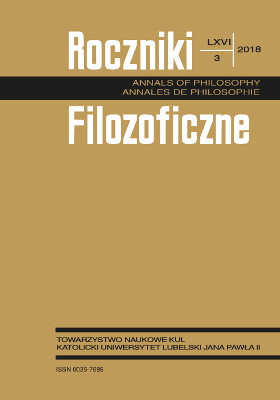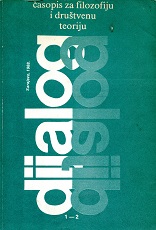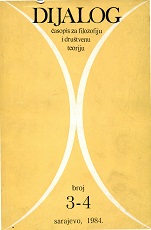Lynn Hankinson Nelson – Jack Nelson: Quine
Review of: Lynn Hankinson Nelson – Jack Nelson: Quine, Přeložil Marián Zouhar. Albert Marenčin – Vydavateľstvo PT, Bratislava 2005, 127 s.
More...We kindly inform you that, as long as the subject affiliation of our 300.000+ articles is in progress, you might get unsufficient or no results on your third level or second level search. In this case, please broaden your search criteria.
Review of: Lynn Hankinson Nelson – Jack Nelson: Quine, Přeložil Marián Zouhar. Albert Marenčin – Vydavateľstvo PT, Bratislava 2005, 127 s.
More...
The introductory section of the paper attempts to clarify the theoretical framework of truth-relativism. The paper then presents three obstacles to those who would like to relativise truth of a statement. These concern the distinction between absolutely and relatively true statements, the identity of a proposition across different perspectives and the possibility of distinguishing between various ways of construing the truth predicate.
More...
The paper tries to offer an overall pragmatic perspective on the concepts „knowledge“, „truth“, and „reality“. The perspective should also pick out the socalled metaphysics of „true world“ and show that the metaphysics is created by a long historical, and that's why un-necessary, tradition. This arbitrary tradition is a reason for popularity of the correspondence theory of truth, in spite of the fact that nobody can explain what „correspondence“ means exactly. The author contrasts this metaphysics with the pragmatic metaphysics of „undemarcation of organism and enviroment“. In pragmatic terms, one truth is defined as a function of language, and hence as a function of life.
More...
The aim of the analyzes carried out in this paper is to show that within the multitude of theories of perception which center their main presuppositions around the idea of action and embodiment, we can distinguish a body of approaches, which characteristically emphasize the following claims: that it is the living organism that should serve as perceiving subject; that perceptual states are not only a form of action but primarily a form of consciousness; that perceptual information is obtained by perceiving subjects from the environment by means of so-called perceptual invariants (i.e. structural indicators, which allow organisms to recognize such perceptual properties as color, shape, size, intensity of sound, type and direction of smell, tactilely given texture, etc.).
More...
Russell's distinction between knowledge by acquaintance and knowledge by description has been recently re-examined in frequently controversial epistemological contributions. The present essay reflects upon the pertinent papers by D. F. Pears. J. Hintikka. R. Chisholm, W. Sellars. A. J. Ayer, and others, but is primarily founded on Russell's significant formulations from his writings published between 1910 and 1918. By employing an auxiliary device of a late-Wittgensteinian language game, I explore at first the situation in which human subject is "experiencing" and naming particular objects (Russell's sense-data and sensibilia) and later the subject's acquaintance with universals. The reconstruction of such situations shows that, contrary to Russell's assumptions, even the "purest" acquaintance cannot function without knowledge by description, i.e. without stating propositions about the object of acquaintance (whatever its nature). Then the only "descriptionless" alternative would be a kind of intuitive knowledge ot such objects which is difficult to reconcile with the position held by Russell in the 1910s. Whatever the consequences, this topic retains its fundamental epistemological significance.
More...
Vo štvrtom čísle minulého ročníka Organonu F vyšiel príspevok Jaroslava Peregrina s názvom Co to je traktátovská teorie jazyka?., ktorý reagoval na moju stať Na obranu osamelých bežcov. V závere príspevku Peregrin píše. že Wittgenstein „opustil onu ,, reprezentační teorii jazyka, o kterou se Traktát opírá — a já jsem ve svém článku apeloval na to, abychom ho právě v tomto následovali. Kvasz je proti tomu - avšak na obranu reprezentační teorie... neříká vůbec nic." ([8], 436). Pri čítaní tejto pasáže som si uvedomil jadro celého nedorozumenia. Ja som totiž z Traktátu nepreberal Wittgensteinovu reprezentačnú teóriu jazyka. Tá mi pripadala z hľadiska cieľov analýzy jazyka vedy nepoužitelná. Napriek tomu sa z Traktátu snažím prebrať obrazovú teóriu významu. A k sa to j a v í ako paradoxné, pokúsim sa to vysvetliť.
More...
Kurt Godel was a solitary genius, whose work influenced all the subsequent developments in mathematics and logic. The striking fundamental results in the decade 1929 1939 that made Godel famous are the completeness of the first order predicate logic proof calculus, the incompleteness of axiomatic theories containing arithmetic, and the consistency o f the axiom of choice and the continuum hypothesis with the other axioms of set theory. During the same decade Godel made other contributions to logic, including work on intuitionism and computability, and later, under the influence of his friendship with Einstein, made a fundamental contribution t o the theory of spacetime. In this article I am going to summarise the most outstanding results on incompleteness and undecidability that changed the fundamental views of modern mathematics.
More...
The aim of the paper is to describe the main epistemological ruptures in the history of modern physics. Our approach is based on the reconstruction of the formal language of physical theories. We examine how particular aspects of the formal language, such as its analytical, expressive, or explanatory power, as well as its analytical and expressive boundaries, have changed in the course of the historical development of physics. In the closing part of the paper we discuss the results of our historical reconstruction from several viewpoints.
More...
V druhom čísle XI ročníka Organonu F1 uverejnil M. Zouhar recenziu mojej knihy Význam a jazyková prax. Cieľom tejto krátkej reakcie nie je polemizovať s názormi recenzenta.
More...
J. Švihran vo svojom príspevku [8] sformuloval niekoľko zaujímavých pripomienok a námietok proti mojej štúdii [4]. Cieľom mojej odpovede j e reagovať na jeho pripomienky a ukázať, že sú v mnohých ohľadoch neopodstatnené.
More...
Táto teória považuje za význam výrazu ideu, ktorú tento výraz zastupuje. Locke hovorí: „Slová sa teda používajú ako zmyslovo vnímateľné znaky ideí a idey, ktoré slová zastupujú, vytvárajú ich vlastný a bezprostredný význam." ([7], 346) Teória zachytávajúca toto hľadisko tvrdí, že jazyk j e nástrojom na zaznamenávanie myslenia a myslenie pozostáva z následnosti ideí vo vedomí.
More...
In 'A Coherence Theory of Truth and Knowledge', Donald Davidson argues that it is not possible for us to be massively mistaken in our beliefs. The argument is based on the possibility of an omniscient interpreter who uses the method of radical interpretation to attribute beliefs, since an omniscient interpreter who uses this method will attribute largely true beliefs to those he is inteipreting. In this paper we investigate some of the assumptions behind this argument, and we argue that these assumptions are incompatible with Davidson's view that the object of a belief is its cause. If Davidson wants to keep his interpretationist theory of mind, he should therefore abandon that view.
More...
The article examines the viability of so-called 'the knowledge argument' that was designed to prove the irreducibility of the subjective, phenomenal aspect of experience to the physical. It is argued that this argument can successfully be defended against its criticism. Its critics are represented here by two physicalist approaches: the mode of presentation hypothesis (here Paul Churchland), and the ability hypothesis (here David Lewis and Laurence Nemirow). The defense of the general soundness of the knowledge argument is based on some important insights on the issue m question of Frank Jackson and Howard Robinson. It is argued that the physicalist counterarguments to the knowledge argument seem inadequate. The article concludes that it appears that the knowledge argument has still kept a significant amount of its initial force.
More...
This paper deals with Watkins's attack on Popper's Theory of Science (PTS). Watkins claims that Popper's theory of verisimilitude (together with his theory of corroboration) introduces justificatiomst and mductivist elements into PTS. The aim of the paper is to show that Watkins"s accusation is false. In PTS there is no good (positive) reason for any conjecture. Similarly, there is no way how any conjecture could be attained by means of induction.
More...
The paper analyses the role of alternatives in some important spheres of human creative activities, especially in the domain of cognitive actions conceived as a search for new knowledge alternatives, in the domain of technological creativity conceived as the creation of more perfect artefacts or more perfect alternatives of actual technological solutions or artefacts.
More...
The author shows how Croce remains limited by his first assumption of the identity of intuition and arts and their complete independence from real social and historic events; he endeavours to explain how and why Croce is much better known for what he denies, rather than for what he asserts, how the field of aesthetic psychology is determined by »an array of negations«, and that arts are not physically, notionaly, morally and essentially pleasant. The text deals with negations mainly, since they refer directly to the cognitive status of the visual presentation of intuition.
More...
In der vorliegenden Arbeit betrachtet man den agnostischen Standpunkt, den der Verfasser in bezug auf die methodologisch-philosophische Thematisierung der Religion aus der perspektive der Philosophie der Religion, der Soziologie der Religion und der Theologie, die, Seiner Meinung nach, alle drei Religionstheorien sind, vertritt. Es wird festgestellt, daß das vom Gesichtspunkt der drei angeführten Religionstheorien ausgehende Heranrücken an die drei Religionstheorien selbst noch so manches zu wünschen übrig läßt, um einen meta-theoretischen Blick auf und über die beschriebenen Betrachtungsmethoden der Disziplin »Religion« und des Religionsphänomens erhalten zu können. Trotzdzm läßt der Autor den Agnostizismus aus extradoktrinären und methodologischen Gründen gelten wegen und hinsichtlich der Coexistenz und der Toleranz der verschiedenen Existenzarten des menschlichen Seins.
More...
Review of: David Hume, Rasprava o ljudskoj prirodi, Logos, Veselin Masleša
More...
Skôr než budem reagovať na kritické pripomienky k mojej stati, s potešením vítam diskusiu, ktorá vzišla z mojej prednášky „Problém vedomia: teoretické a metodologické východiská". Prednáška odznela vo februári v roku 2002 na Trnavskej univerzite v rámci seminára k problematike filozofie mysle.
More...
Review of: Hubert Dreyfus and Charles Taylor: Retrieving Realism Cambridge, MA: Harvard University Press, 2015, 171 pp.
More...